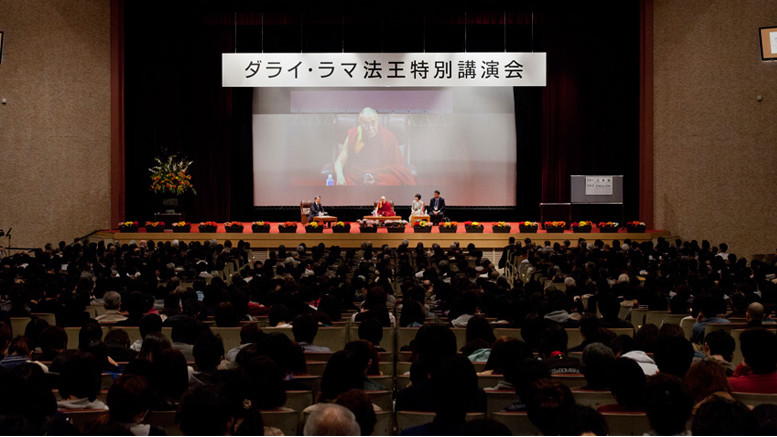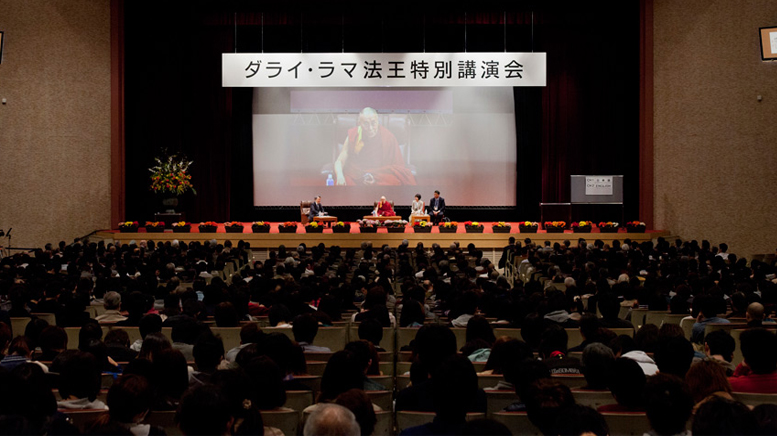
Dalailama.com: Nagoya, Japan 7 April 2015
This morning, His Holiness the Dalai Lama travelled from Tokyo to Nagoya by Shinkansen – ‘Bullet Train’, and drove to the campus of Aichi Gakuin University. The University’s history began as a Soto Zen training centre founded in 1876. It now offers 50,000 students education infused with a spirit of humanity derived from Soto Zen founder Dogen Zenji’s sense that study and practice should not be seen as different.
His Holiness was offered a traditional Japanese lunch in the company of professors and teachers. He then walked to the hall where he was to give his talk to an audience of 3200, interacting with thrilled students on the way. The 2400 students in the hall gave him an enthusiastic welcome as he took the stage.
“Respected elders and younger brothers and sisters,” he responded, “it is a great honour for me to speak to young people like you fresh, still growing men and women. Unlike me you have most of your lives before you. While the past is gone and can’t be changed, you may be able to reshape the future. You have a great opportunity, indeed a responsibility, to make happy individuals of yourselves, belonging to a happy community and nation, part of a happier humanity.
“I have no use for formality, preferring to be informal, but I’d like to request your permission to put on this visor to protect my eyes from the strong light and enable me to see the faces of the audience. Wherever I speak, I think of the speaker and audience as just human beings, physically, mentally and emotionally the same. We all want to live a happy life and to do so is our right. We are all born the same way and we all die the same way; no formality involved.
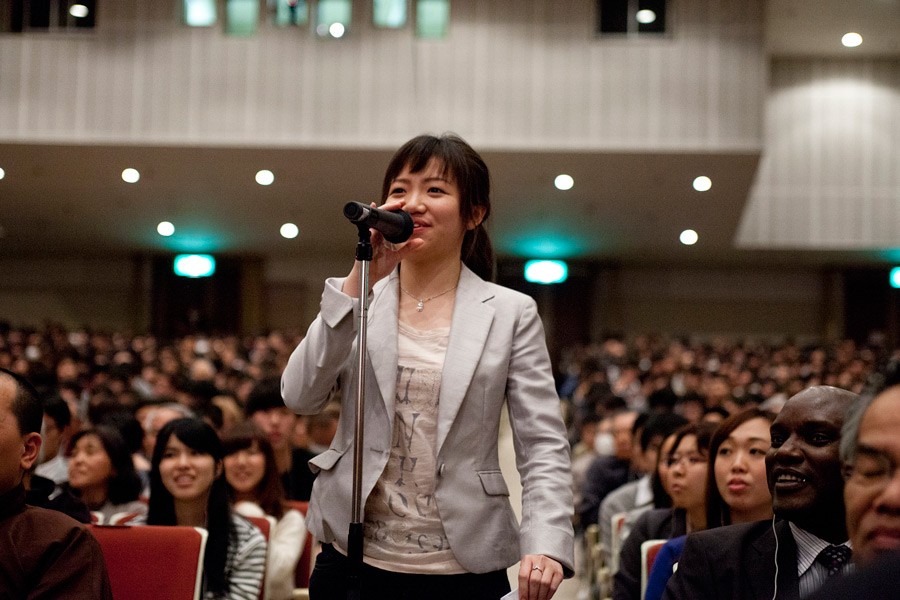
“In today’s reality, the old divisions between ‘us’ and ‘them’ are no longer relevant. Our world is deeply interdependent, both in terms of our economies and the problems like climate change that challenge us all. The reality has changed, but we still tend to see things the old way. This is why, although we don’t wish to do so, we make problems for ourselves. Our thinking is narrow and short-sighted. We don’t see things in a holistic way. There is a gap between our perceptions and reality. You Japanese, for example, have the potential to contribute to the well-being of the whole of Asia, the whole of humanity, rather than limiting your concern to just these islands. Please try to take a broader view.”
His Holiness remarked that although he had already been introduced to the audience, he would like to tell them about his three commitments. Firstly, as a human being he tries to think about the future well-being of the whole of humanity. He noted that in his lifetime, the 20th century had seen unprecedented bloodshed in which historians say 200 million died in violence. If it had produced a good result, it might have been justified. However, His Holiness suggested that even the fighting and killing that is going on today is a symptom of the past century’s negligence and mistakes. He said we need a new approach, one that does not involve the victory of one and the destruction of the other, but sees all human beings as members of one family.
“There are three reasons I try to promote human values as a source of happiness. Firstly, the kindness and affection we are shown by our mothers is our common experience. Secondly, it’s common sense that if a family is wealthy, but lacks basic kindness and affection, its members will likely be unhappy. Thirdly, even scientists today are finding evidence that the really effective source of happiness is peace of mind.
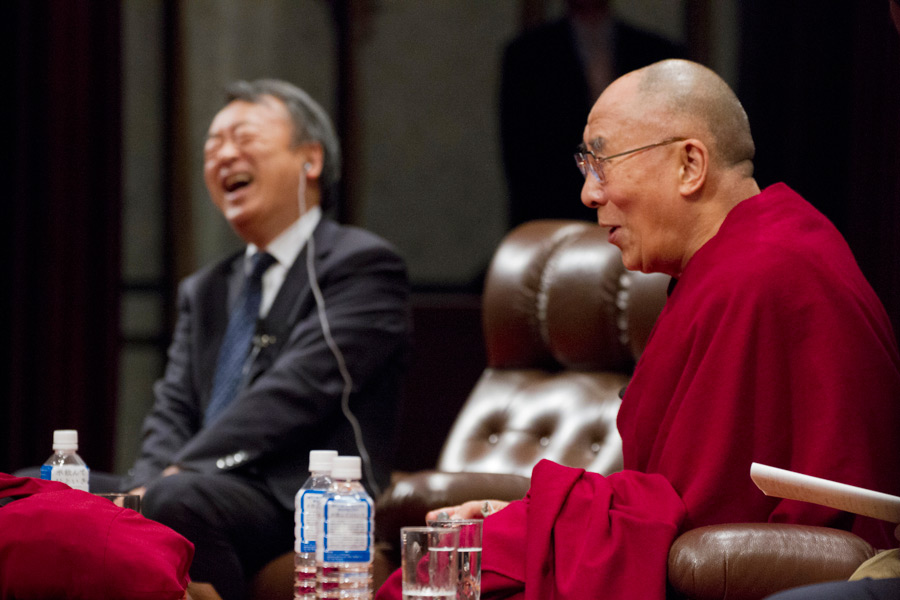
“As a Buddhist monk I see that all religious traditions convey a message of love, tolerance and forgiveness. And because they share a common message, a common practice and a common goal, we can appreciate and respect them all. Finally, as a Tibetan, I want to preserve our unique culture, characterized as it is by peace and non-violence and a respect for all forms of life.”
He added that the content of the more than 300 volumes of Buddhist scriptures, translated mostly from Sanskrit into Tibetan, can be categorized as dealing with science, philosophy and religion. He said a 2 volume book of Buddhist science has been prepared and is being translated into English, Chinese, and other languages so that anyone can read and study the subject. He also referred to discussions he has been holding for 30 years with modern scientists that have resulted in the establishment of the Mind & Life Institute. Part of its work revolves around the interest modern scientists are now taking in the ancient Indian accounts of the workings of the mind and emotions.
“Today the world is facing a moral crisis,” he remarked, “and we can address this by training the mind. But to do so, we need to understand the whole system of our emotions; we need a map of our emotions. This is the contribution the Nalanda tradition that Tibetan and Japanese Buddhism belong to can make to the modern world.”
Journalist Akira Ikegami joined His Holiness on the stage to mediate questions from the audience. He asked him what advice he’d give young people trying to prepare for the future. His Holiness replied:
“It’s difficult to generalize, because people’s needs and abilities are different, but the best thing is to use your intelligence to the full, taking an unbiased, objective and holistic view. What looks grim from one angle may look brighter from other points of view. I lost my freedom at 16, my country at 24, and for 56 years things have been quite difficult. However, if I’d remained in the Potala I’d have been limited to a formal role. As a refugee I’ve been able to live more like a normal human being, making friends at will. I’ve met all kinds of people in many different places and have been able to learn from them.”
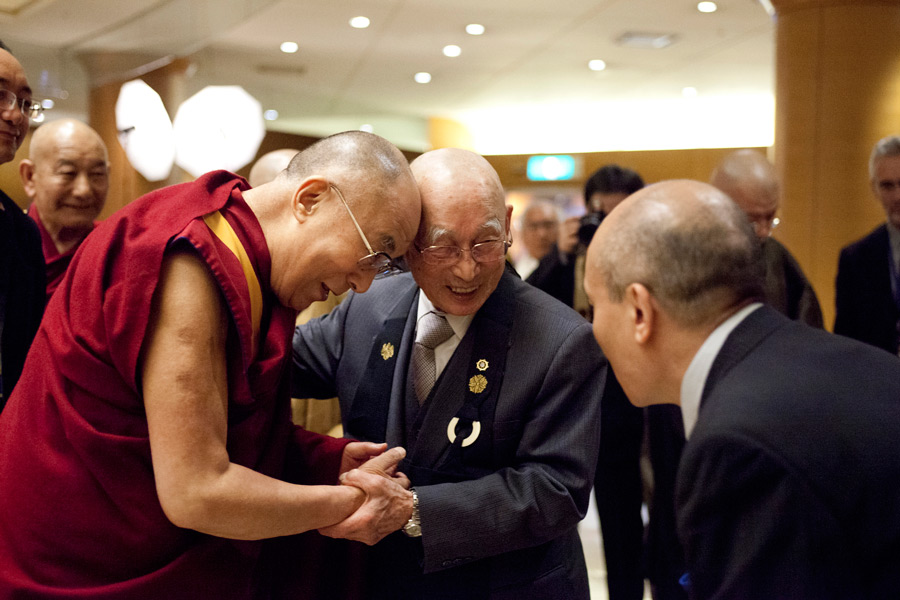
Asked about his evident optimism, His Holiness quoted a conversation he’d had with the British Queen Mother in 1996 when she was 96 and had experienced most of the 20th century. When he asked if she felt the world had got better or worse, she unhesitatingly replied it was better. She said when she was young no one talked about human rights and self-determination in the way that is common today. He pointed out that where science and religion used to be poles apart, today scientists are taking genuine interest in Buddhist knowledge of the mind. He also cited changes such as the collapse of totalitarianism in the Soviet Union and changes that can be seen in China as evidence that the world is moving in a positive direction and that there’s much to be optimistic about.
Asked what advice he’d give students wondering what to do with their lives, he reminded them of the determination with which Japan, and Germany too, had rebuilt themselves from the ashes of war.
“You young Japanese should make more effort to learn English, which would serve you well. I find even my broken English is very useful. I challenge you to learn to speak better than me. And you should consider spending some time volunteering in different parts of the world. With your help many people in Africa and Asia could make their own contribution to the good of the world.”
When another student asked how he became Dalai Lama and how it felt, His Holiness at first dismissed the question as not very relevant, but went on to clarify that Buddhists believe there is life after life. The tradition of recognised reincarnations is said to involve individuals being able to choose when and where to be born. He reported that his mother had told him he clearly spoke of memories of previous lives when he was young. He said he was selected as Dalai Lama when among three candidates he passed the search party’s tests.
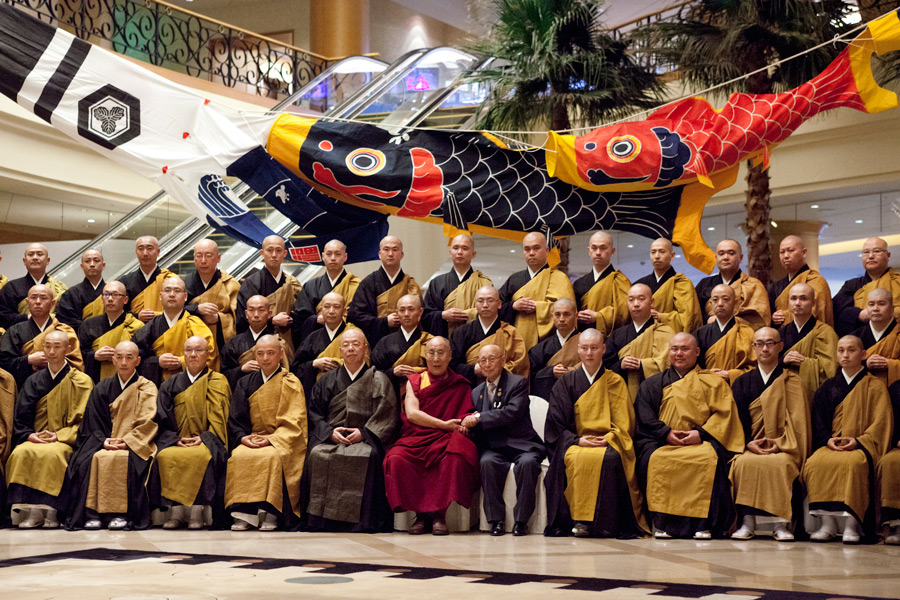
A student who felt his efforts to be altruistic are often contrived asked for advice. His Holiness told him:
“We are social animals who need friends. We need a community to survive. Friends are made on the basis of trust and trust only grows if you are kind to people. Exploiting, cheating and bullying others will win you no friends. Kindness and compassion gives rise to self-confidence, which in turn empowers you to be honest, truthful and transparent. This self-confidence brings peace of mind, which also favours good health.
“A truthful, compassionate attitude is a sign of strength. It’s lying and anger that betray weakness. Take the example of the cause of Tibet. It’s a struggle between the power of truth and the power of the gun. In the immediate short term, the power of the gun is stronger, but in the long run it is the power of truth that will prevail. We oppose China’s misguided policies, but without anger. We seek dialogue and a mutually agreeable solution. We have the support of human rights activists like Nobel Peace Prize winner Liu Xiaobo, who is in jail for his determination to defend the truth.”
As the occasion came to an end, the University President Etsujyo Sato offered His Holiness a gift and received a silk scarf in return. The audience applauded fervently as His Holiness smiled and waved as he left the stage. Tomorrowhe will give a talk in Gifu to mark the 40th anniversary of the All Japan Soto Young Priest Association.

